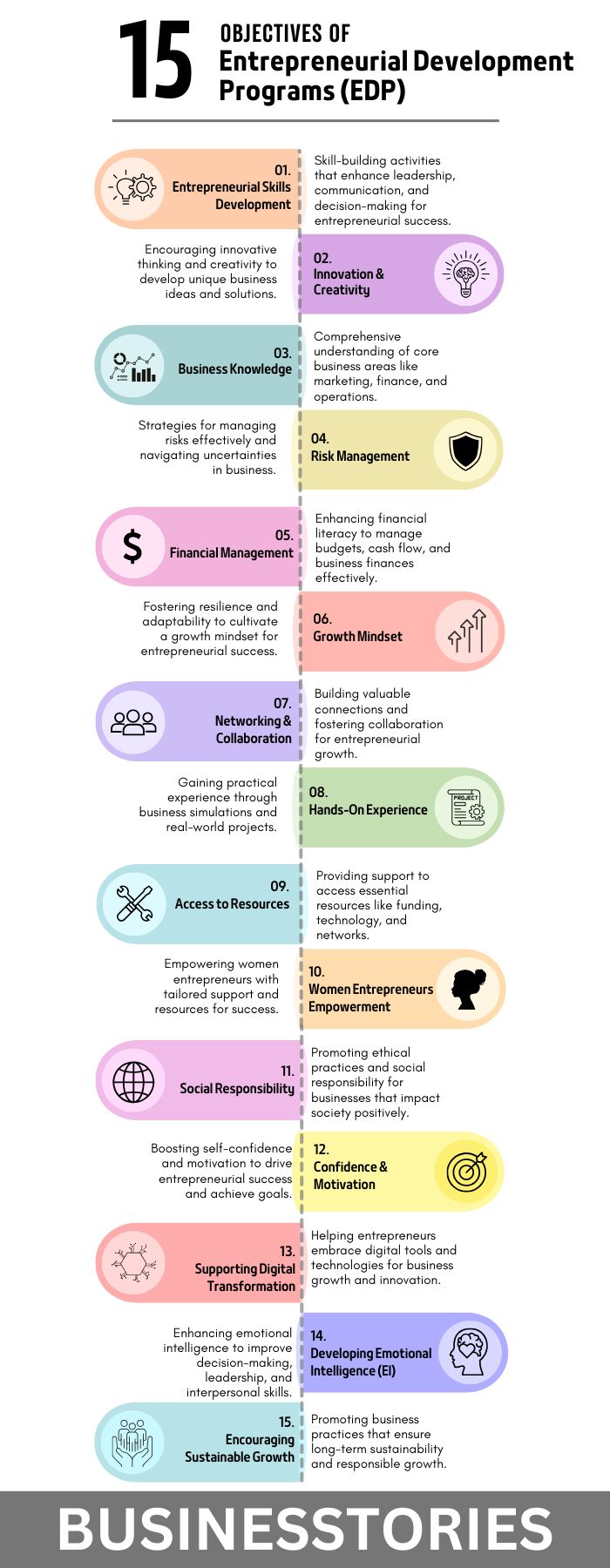Entrepreneurial development programs are developed to train people in areas that are not taught in the book and to bring out their potential for success. Each program will focus on different aims so that would-be entrepreneurs are adequately equipped to face the challenges of the business world. In this article, we have come up with the major objectives of EDP along with their contribute in entrepreneurship.
Top Objectives of Entrepreneurial Development Programs
1. Enhancing Entrepreneurial Skills

Entrepreneurial development programs are aimed towards building critical skills including leadership, communication, problem solving, and decision making, experts argue. These skills are crucial for navigating the complexities of starting and running a business.
Participants typically engage in workshops, role-playing scenarios and leadership exercises that mirror real-world challenges. They need to do all these things that help them build resilience and become better team managers. Moreover, the development of communication ensures entrepreneurs become adept at pitching for their ideas confidently placing them in a position where they can enhance partnerships with stakeholders.
Also Read: How to Become a Business Tycoon
2. Promoting Innovation and Creativity
At the heart of entrepreneurship is innovation. Development programs challenge participants to think outside the box, discover new business opportunities, and create novel solutions to marketing challenges.
With the utilization of brainstorming sessions and design-thinking workshops, these programs force entrepreneurs to think beyond the box. One of the most profound impacts on participants pertains to real-world case studies of innovative startups which provides them the inspiration to think out of the order and come up with innovative product or services.
3. Building Business Knowledge
A good understanding of business concepts is essential for success. Most programs cover critical areas such as marketing, finance, operations, and human resources so participants gain a holistic view of what makes businesses work.
That is because courses on the subject typically entail modules covering market analysis, customer segmentation, and digital marketing strategies, for instance. It also stresses financial literacy so that participants can draw up sound business plans and maintain profitability. Hands-on projects like creating mock business models further solidify this knowledge.
4. Encouraging Risk Management
Entrepreneurship embraces taking calculated risks. Development programs instruct participants on risk assessment, strategic planning, and critical decision-making so that they can mitigate the impact of possible setbacks.
Where participants are taught to perform SWOT (Strengths, Weaknesses, Opportunities, Threats) analyses and then create contingency plans. It equips them to deal with unexpected events and to quickly bounce back from any damages. Case studies of successful risk-takers provide valuable insights into navigating high-stakes scenarios.
5. Entrepreneurial Development Programs Cultivating a Growth Mindset
Entrepreneurship is resilience and adaptability. The goal of such programs is to instill a growth mindset, enabling a framework in which people better accept challenges and grow from failure while striving for achievement.
Self-assessment and development, acknowledging strengths and weaknesses are often key elements of workshops. Uplifting stories about entrepreneurs who overcame adversity inspire participants to act in challenging times.
6. Networking and Collaboration
A good network is crucial for entrepreneurs. Finally, the assistance of the development programs is typically another new way of working with mentors, peers, and industry experts, fostering collaboration and support, forming new group connections.
Sessions with industry leaders provide valuable insights while networking events help participants to build critical connections. Working on other projects as a team teaches entrepreneurs other skills, such as the importance of working together to achieve a common goal.
7. Providing Hands-On Experience
Most programs encourage hands-on learning through business simulations, case studies, and real-world projects. Experiential learning is one practice that allows participants to bring theory into their real-life scenarios.
Internships and live projects with established businesses allow the participants to see firsthand the workings of operations, customer interactions, and market dynamics. This exposure transfers the knowledge gained from academic learning to practical entrepreneurial execution.
8. Strengthening Financial Management Skills
Finance knowledge — Understanding budgeting, accounting, investments, etc. is crucial. For all these obstacles, development programs give entrepreneurs the capacity to monitor funds successfully, and the owners succeed in maintaining their businesses.
Programs often feature workshops on cash flow management, financial statements analysis, and investment solicitation. Entrepreneurs also learn about funding options such as venture capital, crowdfunding, and government grants, enabling them to secure the resources needed to grow their ventures.
9. Empowering Women Entrepreneurs

Specialized programs focus on empowering women, meaning you support women’s empowerment by identifying the challenges women uniquely face and offering resources to overcome them. Such initiatives are crucial for gender equality in entrepreneurship.
Women entrepreneurs’ workshops often cover the work-life balance, access to funding, social responsibility, or overcoming societal barriers more than gender-neutral entrepreneurs’ workshops. Participants draw inspiration and guidance from networking opportunities with successful women entrepreneurs.
10. Entrepreneurial Development Programs Encouraging Social Responsibility
Development programs also promote the idea that businesses should have some positive social benefits. Participants are expected to have ethical practices and consider sustainability for their businesses.
Attendance at training sessions highlight the significance of corporate social responsibility (CSR) and environmental sustainability. Entrepreneurs understand how facilitating the harmonious relationship between their business goals and the needs of society creates sustainable change and builds a greater sense of brand loyalty.
11. Facilitating Access to Resources
Programs often guide participants on accessing funding, technology, and other resources necessary for starting and scaling their businesses. This support is essential for bringing ideas to life.
Entrepreneurs are introduced to incubators, accelerators, and industry networks that provide essential resources. Additionally, they receive guidance on navigating legal requirements, intellectual property rights, and regulatory frameworks.
Also Read: How Entrepreneurship as a Career Can Transform Your Life
12. Entrepreneurial Development Programs To Boosting Confidence and Motivation
Various entrepreneurial development programs are focused on boosting the confidence and inspiring motivation among the participating candidates. It leads to belief in their capability, which enables them to jump into entrepreneurship via these programs.
These programs incorporate motivational talks, peer support groups, and accountability in determining personal success. This kind of motivation keeps participants motivated and focused on the way to fulfilling their entrepreneurial goals.
13. Supporting Digital Transformation
Digital skills are essential for entrepreneurial success in modern times. Commercialization-focused training-based programs such as these help participants learn how to utilize technology to streamline their business operations, build and maintain relationships with potential customers, and finally, take their business to the global level.
Participants gain knowledge of CRM systems, e-commerce platforms, and online marketing techniques relating to digital tools. These skills enable them to stay competitive in an increasingly digital world.
14. Developing Emotional Intelligence (EI)
Strong emotional intelligence is key to establishing relationships, handling stress, and leading teams effectively. EDPs recognize that EI matters, emphasizing self-awareness, empathy, and interpersonal skills training.
Combined with group discussions and interactive exercises, participants learn how to manage workplace conflict, better understand customer needs, and develop an organizational culture.
15. Encouraging Sustainable Growth
For long-term development, entrepreneur initiative teaches sustainable growth-focused tactics that help in developing huge industries, as opposed to the fallacy of short-term gains. This encourages them to scalable business models and ethical practices.
Through workshops focused on sustainability, resource management, and work-life balance, members learn how to scale their businesses without sacrificing personal well-being or environmental integrity.
Conclusion
The Objectives of EDP (Entrepreneurial Development Programs) play a pivotal role in preparing individuals for the challenges and opportunities of the business world. By focusing on these objectives, they ensure that aspiring entrepreneurs have the tools and mindset needed to build successful, sustainable ventures. These initiatives not only provide real skills but also challenge them to think out of the box, work together, and establish businesses that contribute good to the world. Whether you are launching a business or planning to shake up an industry, these programs lay the groundwork for sustained success.




